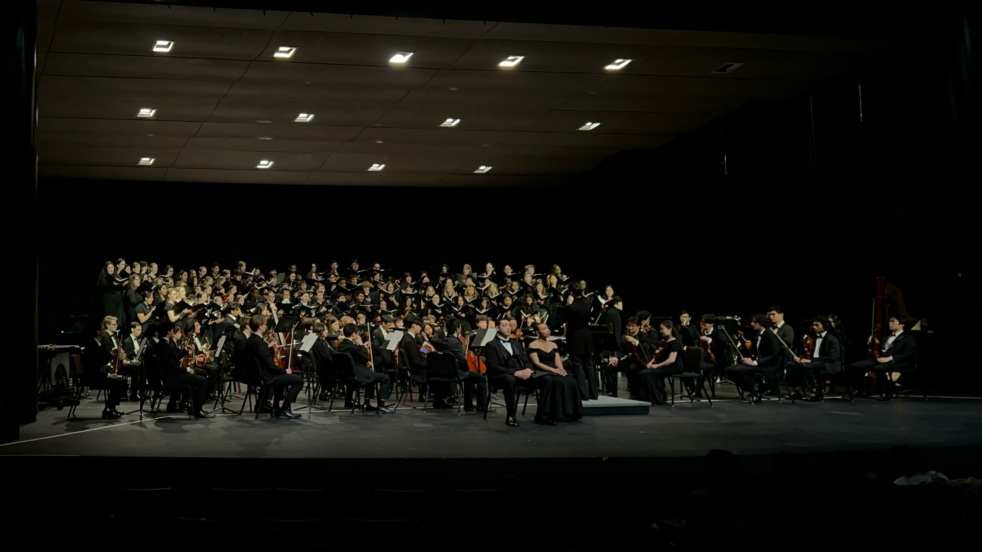On Thursday, Feb. 15, there were almost no open seats in sight as the audience waited for “Romantic Masters VIII: Ein deutsches Requiem” to begin. Presented by the Institute’s School of Music, the performance saw the GT Symphony Orchestra, Chorale, Treble Choir and Chamber Choir performing together at the Ferst Center for the Arts.
The concert began promptly at 7:30 p.m. with an opening performance of “Ram Tori Maya”, composed by Reena Esmail. With the GT Symphony Orchestra playing the backing music, Aditya Hingoo and Dhruv Pargai delivered a soulful and moving performance of the song. Even though it was introduced in the digital concert program, many viewers had still expected a direct launch into “Ein deutshces Requiem.“ However, the opening performance set the stage perfectly for the main act to come.
After Hinggo and Pargai left the stage, Chaowen Ting, the conductor of the GT Symphony Orchestra, stepped down from the conductor’s podium and took the time to say a few words — both about the opening performance and the one about to begin.
She spoke about how both pieces were tributes to those who live after the dead have left and the beauty there is in that. Ting highlighted how even though “Ram Tori Maya” and “Ein deutshces Requiem” may have come from very different places geographically (India and Germany, respectively), they both have the same underlying spirit of being a tribute to life in the present. She commented on how beautiful it is that such concepts can transcend geographical borders and appear in the same medium.
The night’s surprises had just begun as Ting introduced two soloists to the stage: Amanda Sheriff, a soprano who is currently a Glynn Studio Artist at the Atlanta Opera, and Calvin Griffin, a Bass-Baritone who will be returning to the Metropolitan Opera for the 2023-2024 season. Both soloists were clad in concert formal, mirroring the sea of concert black from the students behind them, and took a seat at the front and center of the stage.
With this final order of business settled, Ting took to the conductor’s podium to begin “Ein deutsches Requiem,” or translated to “A German Requiem.” The piece consisted of seven movements, which together lasted slightly more than a hour. The first movement began with the orchestra starting the instrumental track as the choirs sang the first line of the piece, which translated to “Blessed are they that carry sorrow, for they shall grow consoled.”
The second movement started with a similar sentiment; the choir sang a haunting line, which translates to, “For all flesh, it is as grass, and all the glory of mankind as the grass’s flowers.” This movement was significantly longer, but the moment of silence at its end was captivating. The end of each movement was poignant; the abrupt shift from the symphony of music to just the sound of turning pages served as a divider between movements and a time for the audience to reflect before the performers launched
into another emotional act.
Both the soloists, Sheriff and Griffin, performed separate solos with the accompaniment of the orchestra. The performances were breathtaking, and it was amazing to hear the strength in their individual voices as opposed to the power of almost 100 voices singing together. Each was beautiful in its own way, but something was especially hauntingly beautiful about hearing so many voices singing about the value of grief together.
The choirs had an impressive unity, almost sounding like a singular voice. This was especially impressive considering that Chorale, Treble and Chamber are three different choirs that usually meet and rehearse separately.
This idea of grief as a gift rather than a burden was carried throughout the entire performance. In some parts, the orchestra brought the choirs through the movements — matching the ebbing and flowing of the voices. In others, the choirs took the backseat as the audience was invited to fully immerse themselves in just the instrumental parts of the composition.
This seamless give-and-take between the orchestra and the choirs was a testament to the time and effort each student had put into the concert. Orchestrating a concert that involves almost non-stop playing and singing for an hour is no easy feat. Students spent countless hours outside of their own organization rehearsals practicing together to do Brahms’ composition justice, and they most definitely did.
Tech is not a school that is particularly known for its arts programs, especially its music programs. It was inspiring to see so many students on the stage and so many supporters in the audience, united by a singular thing: their passion for music.
To learn about other concerts happening within the School of Music in Spring 2024, go to music.gatech.edu to view the concert schedule and other exhibits currently being hosted by the School of Music.
